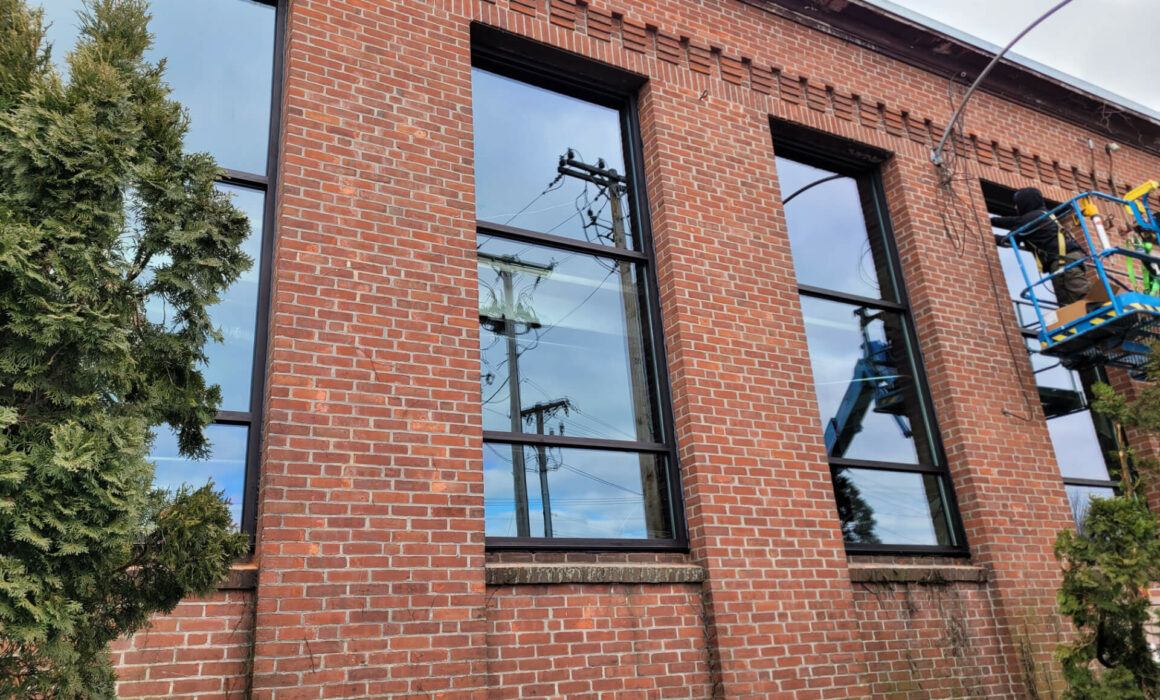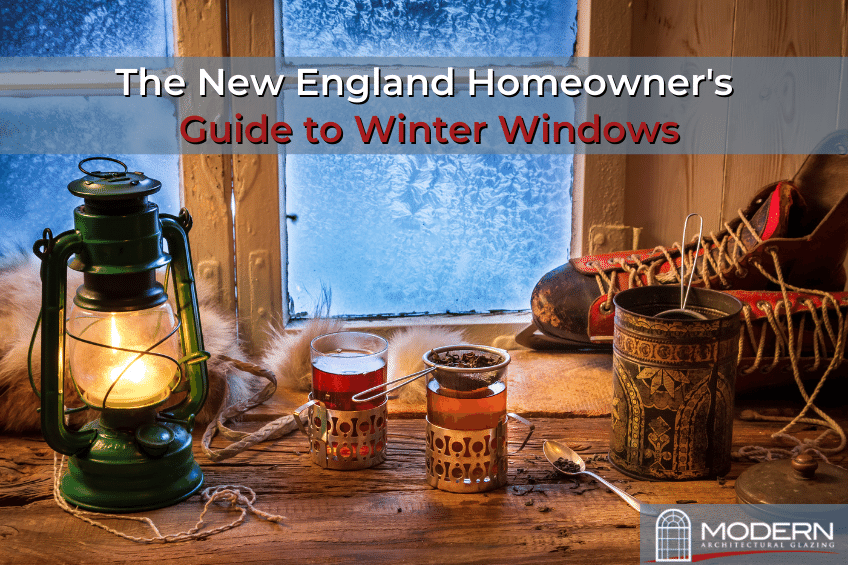The New England Homeowner’s Guide to Winter Windows
Are your winter windows ready for the cold? When a major snowstorm hits, people usually think of replacing their windows. Every homeowner asks, “Do I need to replace my windows or just have them insulated?” Is there a difference between vinyl and aluminum? This article will clarify all those questions for you.
If you live in New England and want to enjoy the beautiful weather without paying your utility bills through the nose, keep reading to learn how to seal your windows for winter.
What We’ll Cover:
- What are winter windows?
- Types of winter windows
- Frame options
- Glass options
- How to properly seal your windows
- What do the U-value and R-value mean?
- Regulations and incentives for window replacement
- Key takeaways
What Are Winter Windows?
A winter window is a type of window specifically designed for cold climates. It typically consists of a double-pane window with an insulated air space between the panes. This design prevents heat from escaping with optimal winter window insulation.
A winter window’s main purpose is to keep your home at a comfortable temperature during extremely cold months.
Types of Winter Windows
When temperatures dip, energy costs increase exponentially. That’s why your building needs adequate equipment to withstand cold weather. Keeping the cold out can help reduce energy use. That’s why you must replace your existing home windows with new ones that can handle the weather conditions.
Having energy-efficient windows in your home will provide you with more comfortable living spaces and lower energy expenditures.
A window consists of its frame and the glazing (or glass). Keep reading to learn more about the types of frames you can purchase for your home or business.
Winter Window Frames
To keep your home as warm and cozy as possible during winter, one of the first things you should consider is whether your window frame is in good condition. A high-quality window frame can be a source of energy savings, so you must make it from appropriate materials.
Aluminum frames are not ideal for cold weather climates as they allow your room’s heat to escape quickly through the frames. This flaw can make your heating system work harder than usual. Instead, opt for a fiberglass, wood, or vinyl frame as winter window insulation.
1) Fiberglass
Fiberglass frames offer superior durability and insulation compared to wood, aluminum, and vinyl, making them an excellent choice for regions that experience severe weather conditions like heavy snowstorms. These frames are composed of glass fibers and resin, which allow them to maintain their shape and efficacy under fluctuating temperatures without warping or corroding.
The air cavities within fiberglass frames can be filled with additional insulation, enhancing their ability to keep the interior of your home cozy. However, the initial cost of fiberglass frames can be higher than other materials, but their long-term energy savings and minimal upkeep can offset the upfront investment.
2) Wood with Cladding
Wood frames are highly sought after for their natural insulation properties and aesthetic appeal, making them a popular choice for traditional home designs. To combat the challenges of maintenance and durability, especially in wet winter conditions, wood frames are often clad with aluminum or vinyl. This cladding shields the wood from direct exposure to the elements, preventing moisture damage and decay while retaining the insulative benefits of wood.
Cladding also simplifies maintenance, though it does increase the overall cost of the window frame. The combined benefits of warmth and enhanced durability make clad wood an attractive option for homeowners who value both performance and design.
3) Vinyl
Vinyl window frames are known for their cost-effectiveness and excellent thermal properties. Made from PVC, these frames offer significant resistance to heat transfer, which is a pivotal feature for maintaining comfortable indoor temperatures in winter. Vinyl frames are also resistant to moisture and decay, require little maintenance, and are generally less expensive than fiberglass and wood options.
However, they might lack the strength of fiberglass and the aesthetic charm of wood, making them more suitable for utilitarian rather than premium applications. Nonetheless, for homeowners looking for an affordable, effective way to enhance their home’s thermal efficiency, vinyl frames are a compelling choice.
Winter Window Glasses
In New England, where winters can be particularly harsh, inspecting and maintaining your winter windows is essential to keeping your home warm and energy-efficient. As the cold months approach, ensure that all seals and weather stripping are intact to prevent drafts and heat loss. Check for any signs of damage, such as cracks or gaps, which can be exacerbated by the freezing temperatures and potentially lead to higher energy bills.
Regular maintenance will also enhance their longevity and performance. For optimal insulation, consider applying a window insulation kit to any single-pane unit. This method is a simple yet effective way to increase your home’s thermal efficiency during the biting winter months.
When it comes to window glasses, you should keep these tips in mind:
1) Opt for double or triple window panes
Use a minimum of double-pane windows and triple-pane where possible. Triple-pane glass has three layers that work together to provide better insulation and is more efficient than double-pane glass. Do not use single-pane windows, especially during winter. Although they may be common, they are poor at insulating houses.
2) The air gap between panes
Windows generally have an air gap between two or three panes of glass. This gap provides extra protection by trapping warm air and staving off cold drafts. This precaution helps insulate your home and lower your heating bills using winter window insulation.
3) Use glass coating
The glass coating can be a mix of metallic oxide. A barrier is applied to one or both sides to reflect heat radiation.

How to Seal Your Windows for Winter
Replacing windows is one way to stay warm when the temperature drops. However, a more cost-effective option is learning how to seal windows for winter. The following are the most effective ways to seal your windows.
1) Replace cracked glass
Windows are often damaged by the elements, making them a major source of heat loss. Properly sealing your windows is a simple way to save money on heating costs.
Cracked glasses are a safety hazard, and cold air can enter through them, lowering the temperature in your home. If you have broken panes, you should replace them with new ones.
2) Reinforce with winter window insulation films
Window insulation film provides a barrier between the interior of your house and the outside world. When choosing a window insulation film, ensure that it suits your needs and budget.
To get your winter window insulation kit, consider factors like the insulation thickness and types of material.
3) Fill cracks with caulk
If your walls have cracks, cold air can pass through them, making it difficult for your heater to work. Make sure the cracks are sealed up.
Use a high-quality silicon-based caulk to seal any gaps. Ensure you carefully scrape the old caulk off before applying the new caulk to your windows.
4) Use bubble wrap
Bubble wrap is a good insulation material. By encouraging air to remain in small pockets, bubble wrap serves as an effective insulator.
Use bubble wrap with larger bubbles to keep in the heat. The larger bubbles will keep your home warmer than the smaller ones.
5) Install storm windows
Storm windows are exterior or interior windows mounted to protect a house from extreme weather. They can be installed in all windows, but they are often found on windows that need better insulation.
Storm windows are a great investment and can help increase your home’s energy efficiency if your home doesn’t have insulated-glass windows.
Understanding U-Value and R-Value in Winter Windows
As you explore options for winter windows, it’s essential to grasp two critical terms that greatly influence your home’s thermal efficiency: U-value and R-value. These metrics are pivotal in determining how well your windows can resist the cold and keep your home warm during harsh New England winters.
What Is U-Value?
U-value, often referred to as the U-factor, measures the rate of heat transfer through a window. Essentially, it tells you how well a window can keep heat from escaping. In the context of winter windows, a lower U-value is desirable as it indicates better insulation properties. Windows with a low U-value have a higher resistance to heat flow and provide better insulation. This feature is crucial in winter, where retaining heat becomes a priority for comfortable living and energy efficiency.
What Is R-Value?
R-value, on the other hand, assesses the insulating ability of your windows. Unlike the U-value, a higher R-value is preferable as it signifies greater insulation effectiveness. Windows with a high R-value are more efficient at preventing heat loss. This precaution is especially important in cold regions, as it contributes significantly to maintaining a warm and cozy indoor environment without overburdening your heating system.
When selecting winter windows, it’s important to look for options with an optimal balance of low U-value and high R-value. This combination ensures that your windows offer the best defense against the cold, keeping your home energy-efficient and comfortable throughout the winter months.
Understanding these values can help you make a more informed decision about upgrading or replacing your winter windows. This overview will enhance your home’s thermal comfort and reduce energy costs, making your investment in high-quality modern windows a wise and cost-effective choice for your New England home.
Regulations and Incentives for Window Replacement in New England
Understanding local regulations and incentives is crucial for homeowners considering modern window upgrades in New England. These guidelines ensure compliance with energy efficiency standards and offer financial benefits that make the investment more affordable and appealing.
Federal Energy Efficiency Standards
The Department of Energy (DOE) sets federal energy efficiency standards that dictate the minimum performance requirements for residential windows. Adhering to these standards ensures that all window installations help reduce energy consumption. For homeowners, this means selecting windows that meet or exceed these benchmarks is essential for both compliance and energy savings.
State-Specific Regulations
Each state in New England may have additional regulations affecting window installation, focusing on thermal performance to withstand cold winters. For instance, certain states require that aluminum windows undergo energy performance ratings and inspections post-installation to ensure they meet local energy codes. These measures aim to enhance the building’s thermal envelope, reducing heating needs and promoting sustainability.
Incentive Programs Overview
New England homeowners can access various incentive programs designed to offset the costs associated with upgrading to energy-efficient windows. These programs range from federal tax credits to state-specific rebates and grants that encourage energy conservation.

EnergyStar Certifications
EnergyStar ratings serve as a guide for selecting modern windows that offer superior energy efficiency. Windows that achieve EnergyStar certification have been rigorously tested and proven to perform above the industry standards for insulation and UV protection. Opting for EnergyStar-certified windows can qualify homeowners for additional rebates and tax credits, maximizing the return on their investment.
MassSAVE Program
A significant incentive in Massachusetts is the MassSAVE program, which offers various rebates and zero-interest loans to homeowners who install energy-efficient windows. By participating in MassSAVE, homeowners can receive direct financial assistance to cover a portion of the cost of purchasing and installing eligible storefronts and windows, making this upgrade more accessible and affordable.
Other Local Incentives
Beyond federal and state programs, local utilities in New England often provide incentives for energy-efficient upgrades. These can include direct rebates or special financing options specific to residents of certain areas or customers of specific utilities. Homeowners are encouraged to research and contact their local utility providers to discover available offers, such as curtain walls and glass storefronts.
How to Apply for Incentives
To apply for window replacement incentives:
- Check the EnergyStar and local government websites for up-to-date information on available incentives.
- Review the eligibility requirements to ensure your window replacement project qualifies.
- Collect necessary documentation, such as energy audits or proof of EnergyStar certification.
- Submit application forms to the relevant programs, often available online, before the installation begins to ensure eligibility.
- Work with qualified professionals who can provide further guidance, ensure that your modern windows meet all regulatory requirements, and maximize available incentives.
Leveraging local regulations and incentive programs can significantly reduce the cost and enhance the effectiveness of window replacements in New England homes. Homeowners are advised to consult with experienced professionals who can help navigate the complex landscape of energy efficiency standards and incentive applications.
This approach not only ensures compliance but also maximizes the financial and environmental benefits of upgrading to energy-efficient windows.
Key Takeaways
Upgrading your winter windows is a strategic move for enhancing your home’s warmth and energy efficiency, especially in New England’s harsh winters. Here are the crucial points to remember:
- Winter Windows: Choosing the right winter windows, such as double—or triple-pane models, is essential for insulating your home and reducing heating costs.
- Material Matters: The materials of your window frames—whether fiberglass, wood, or vinyl—play a significant role in energy conservation and durability against winter conditions.
- Sealing Techniques: Proper sealing and insulation techniques, such asg caulking and weather stripping,g, are vital for preventing drafts and heat loss.
- Government Incentives: Leveraging government incentives and programs like EnergyStar and MassSAVE can significantly lower the costs of upgrading to energy-efficient windows. These programs offer rebates and loans that make it financially feasible to enhance your home’s energy performance.
- Professional Guidance: Always consult with professionals who can provide the best solutions tailored to your home’s needs and help you navigate the various incentives and regulations.
By understanding these elements and taking proactive steps, you can ensure that your home remains warm, energy-efficient, and comfortable throughout the winter months.

